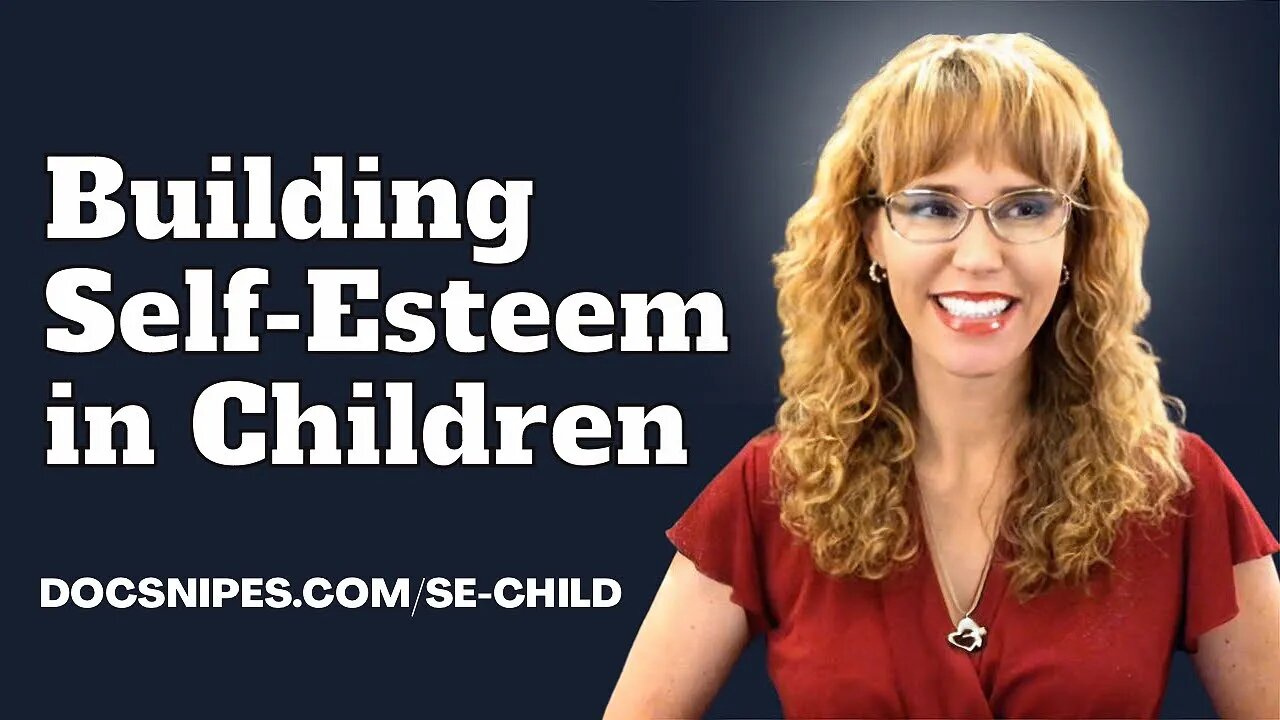Premium Only Content

Building Self Esteem in Children | Attachment Based CBT Tools
Dr. Dawn-Elise Snipes is a Licensed Professional Counselor and Qualified Clinical Supervisor. She received her PhD in Mental Health Counseling from the University of Florida in 2002. In addition to being a practicing clinician, she has provided training to counselors, social workers, nurses and case managers internationally since 2006 through AllCEUs.com 📢SUBSCRIBE and click the BELL to get notified when new videos are uploaded.
💲 AllCEUs.com Unlimited CEUs $59 based on these videos
#Selfesteem #buildingselfesteem #CBTtherapy
Join this channel to get access to perks:
https://www.youtube.com/channel/UCAE3JJi8tX7gfhZEXCUGd_A/join
NOTE: ALL VIDEOS are for educational purposes only and are NOT a replacement for medical advice or counseling from a licensed professional.
Explore why secure attachment is important in nurturing self esteem
Identify 5 general things caregivers can do to enhance self esteem
Identify at least 10 activities that caregivers can do to build self-esteem in children
Children must feel confident that they will be
Loved and safe
Empowered to be authentic
Able feel and express their feelings and needs
Encouraged to try new things
Consistency in presence and messaging
Responsiveness to help the person learn to identify and address their thoughts, feelings, wants, needs
Attention (positive)
Validation of thoughts and feelings to develop emotional intelligence, boundaries and problem-solving skills
Encouragement to use new skills and try new things
Safety (unconditional positive regard)
3 times a day communicate with the child using their love language: Quality time, touch, words of affirmation (how valuable you are to me), acts of service (i.e. making their favorite dinner just because)
Watch your language. Love the person, critique the behaviors. This is true when talking about anyone’s behaviors
Reframe weaknesses as strengths. Instead of stubborn, use determined. Instead of hyperactive, use energetic.
Remember that behavior is communication. Set them up for success not criticism… If a child is acting out
Do they realize the behavior is inappropriate in this context?
Are you expecting too much of them? (sitting still for an hour, “behaving” at a restaurant at 8pm, behaving at the grocery after school)
What are they communicating?
Do they have an alternate response to use?
Video by Dr. Dawn Elise Snipes on integrative behavioral health approaches including counseling techniques and skills for improving mental health and reducing mental illness.
AllCEUs provides multimedia counselor education and CEUs for LPCs, LMHCs, LMFTs and LCSWs as well as addiction counselor precertification training and continuing education.
Unlimited Counseling CEs and Social Work CEUs for $59
Specialty Certificates and #MasterClass starting at $89
AllCEUs courses for counselor continuing education are accepted in most states because we are an approved education provider for NAADAC, the States of Florida and Texas Boards of Social Work and Mental Health/Professional Counseling, the California Consortium for Addiction Professionals and Professions, the Australian Counselling Association, CRCC, Canadian Counselling and Psychotherapy Association and more.
Dr. Dawn-Elise Snipes teaches adults how to use cognitive behavioral therapy tools for building resilience at work, among staff and in children.
Many of the skills in the videos are the same ones that are taought in a basic counselling course and can be used as a CBT therapist aid. CBT techniques are helpful tools for self counseling for major depressive disorder, anger management, confidence, self esteem, anxiety, abandonment issues, self improvement
Dr. Snipes' videos have been used by thousands for developing clinical skills for substance abuse counseling, cbt interventions for substance abuse, and skills needed for mental health counselor
-
 52:04
52:04
DocSnipes
1 year agoRevealing How Neurotransmitters Influence Addiction Recovery and PAWS
242 -
 8:36
8:36
Gamers Unbeaten
14 hours agoMarvel Rivals: The Menace of Jeff the Shark | Deep Thoughts While Gaming
11.3K1 -
 11:05
11:05
Guns & Gadgets 2nd Amendment News
10 hours agoBREAKING NEWS: ATF Reinstituting The Pistol Brace Ban?!
8.65K8 -
 48:04
48:04
PMG
11 hours ago $0.22 earned"Will Trump FINALLY Prosecute the 2020 Election Criminals? w/ FEC Commissioner Trey Trainor"
5.83K -
 LIVE
LIVE
Phyxicx
11 hours agoFinal Fantasy XIV - Finishing Stormblood - 1/11/2025
842 watching -
 9:21
9:21
BlackDiamondGunsandGear
11 hours agoBest of Both AR-15 + Ak47 = CMMG Mutant DISSENT
55.1K8 -
 4:27:23
4:27:23
JdaDelete
22 hours ago $11.59 earnedCool Spot - Sega Saturday + Pizza Tower (Encore)
102K6 -
 14:13
14:13
Tundra Tactical
6 hours ago $2.45 earnedMatt Livelsberger: Master Spy or Tragic Downfall?
25.7K6 -
 4:50:45
4:50:45
Rotella Games
12 hours agoMake the Manor Great Again | The Bread Chronicles | Day 2
62.1K2 -
 9:26
9:26
Jamesons Travels
1 day ago $7.62 earnedShawn Ryan CLOWNS Intel Expert & It GETS WEIRD!
65.8K7